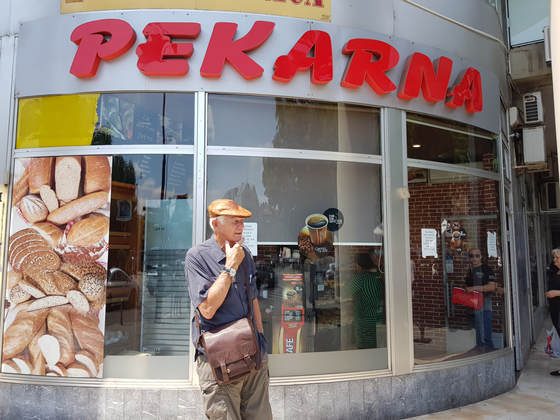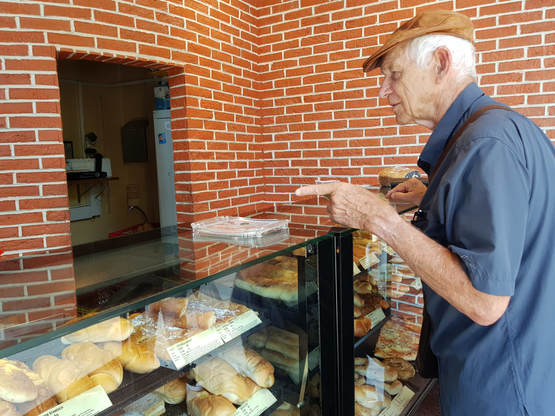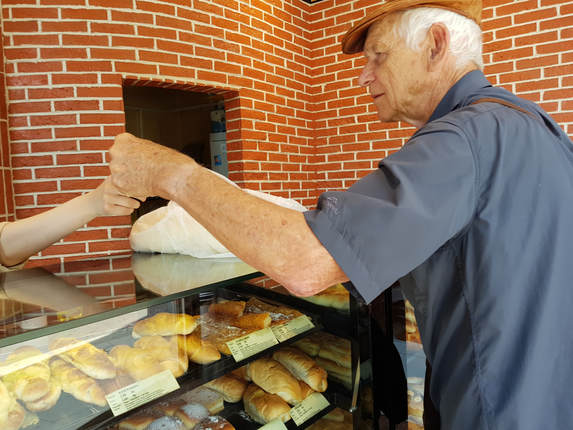Learning Croatian through experiences #002My Aussie accent
Obviously there is a law in Croatia that there must be a bakery (pekarna or pekarnica) no more than 75 metres from another bakery. Through Aussie eyes, the density of bakeries is quite phenomenal! 
And in every one, I see crusty white bread that gets my juices flowing. How can I walk past? Why can’t I find bread like that at home? The only question is “Cijeli kruh ili pola?”
The thing is that bakeries provide an ideal opportunity for learning Croatian. After all, what sort of a baby step is it to ask for a loaf of white bread?
But they also provide an ideal opportunity to fall on one’s face, as the following anecdote will show. Context .... In Australia we have people (both citizens and visitors) from dozens of countries. Because we mix with them in so many facets of life – family, work, sport, arts, school, neighbours – most of us are pretty good at identifying approximately where they have come from by their accent when they talk English. For those of us of Croatian origin, it is usually quite easy to tell if someone comes from Croatia, Italy, Greece, Germany, or Russia. People from each of these countries seem to be locked into their particular form of “pidgin English”. Of course, there are even differences between the accents of people from various parts of Croatia. I am not talking about the use of different words for the same thing, but different tones, different styles of talking, and different abilities to say certain words. Currently I am trying to distinguish the accents of people from Šibenik and Split. (If you believe that, you’ll believe anything!)
I can imitate the voices of people from some other countries when they speak English, but it occurs to me that I cannot define, nor analyse, the features that are characteristic of people from Italy, compared with those from Croatia.
Except I suppose that many people from the Balkans say “v” instead of “w” (“Ven is bus coming?”), and “d” or “t” instead of “th” (“Dis ting is no good”). No, I am not making fun of “newstrayans”, as we used to call them: I am so full of admiration for people who have re-started their lives and learnt new ways, and new languages – often as adults. But the “imperfections” and differences are fascinating. Which brings me at last to my point - which is at my expense…
I did not grow up speaking Croatian, so I have an accent – and one that tells Croatians that I come from Australia.
How do I know this? Well first of all, it simply must be the case. Secondly, I have experiences ....
My experience ....
One morning with Mateja in Zagreb, I decided to buy some white bread. I told her that I was going to use the opportunity for language practice, so she began to take photos and videos of the occasion. Firstly, I had to get my order word-perfect. So easy!
Practice makes perfect. Under the watchful eye of my mentor, Mateja.
When I had attained absolute perfection (and confidence), I went in. Mateja waited outside, throwing me in the deep end, and watching. I got the bread that I wanted, but things didn’t go well. It was a bad day for me. Here is how it went… 
“Dobar dan. Molim vas, jedan bijeli kruh.”
No problems! The transaction went along beautifully, just as though I were a stari Zagrepčanin. Until, as she took my money …. 
“Izvolite. Još nešto? Jeste li ……….” [Wait for it]. Ajme meni! And I thought that I spoke such perfect Croatian!
Reflections ….
OK, so I have an Aussie accent! No question. But what sort of accent? What are the characteristics of my accent? How does it sound to Croatians? How can I know, so that I might improve it? Is it possible to know your own accent?
Getting around
You can browse or search this website in the following ways:
AHA! Learning Croatian with Bob
Correspondence: [email protected]
1 Comment
Didrik
24/7/2020 16:24:45
Hearing your own accent can be difficult even in your native tongue, so much so that I think it is often easier to impersonate someone else's accent than hear your own. Maybe you can pick somebody to impersonate if you want to 'pass'. How's this for a brag though - on my first visit to Croatia I, a UK English speaker who had learned a few words from a Berlitz phrase book, was taken to be Polish when I said "dobra večer" to a waiter. I obviously, in spite of my efforts to pass, still sounded like a foreigner but at least I sounded Slavic!
Reply
Leave a Reply. |